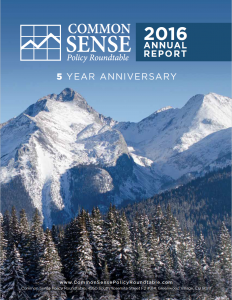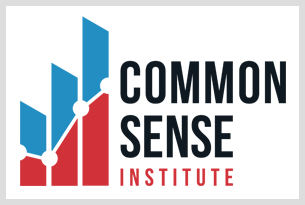 Dear Common Sense Stakeholder,
Dear Common Sense Stakeholder,
Five Years! It is hard to believe that Common Sense Policy Roundtable (CSPR) is celebrating our five-year anniversary. To those of you who stepped up and supported our vision for the last five years, “Thank you.” We have done what we promised.
From day one, our first promise was to find an econometric model that uniquely assesses Colorado’s economy as various public issues came before the legislature and the public. Our board and supporters knew that dynamic modeling, for which Lawrence Klein got the Noble Prize, was the best way to assess the economic impact of public policy issues. Thanks to the Metro Denver EDC, Denver South EDP, and CSPR we cobbled together the monies for the purchase of the best model already being used in other states—The REMI model.
On a nonpartisan basis we weighed in on public policy issues ranging from the economic impact of educational reform at the local level to the impact of raising taxes for additional spending for K-12 education. CSPR even identified the educational outcomes which could result in more jobs and higher state growth to economically justify the additional spending.
PERA’s financial challenges have continuously been on our radar screen. Most everyone knows about the pension funding deficit relative to current obligations. There is a deficit ranging from $25B to $29B. This is staggering for a state whose annual budget is similar in size. There has been much criticism of PERA so we decided to investigate. What we found was that PERA programs are generous when compared to private retirement plan opportunities for equivalent positions. Additionally, the other surrounding state’s programs, generally, were not as robust. Then we asked and answered the issue of investment management. Here we saw a well-diversified portfolio managed as well as one could hope but unlikely to achieve the actuarial return in the 7% plus range. This year’s updated assessment once again concludes, structural changes are needed, and I encourage you to see to see CSPR’s website for the report.
Where CSPR research and modeling may have had the biggest impact over the past five years has been in the energy setback studies. Without CSPR’s econometric modeling via our customized REMI model, clarity as to the economic impact of the various proposed setbacks for drilling around the state would have lacked solid economic analysis. Thus, with CSPR’s REMI model and the steady hand of CU Leeds School of Business team, lead by Rich Wobbekind and Brian Lewandowski, the possible job impact as well as the economic consequences of the various proposals was made public and became a foundation for the public debate on this issue. See more on the following pages.
Beyond the heavy lifting CSPR did with setback studies in 2016, the Minimum Wage Referendum needed an objective source to assess the economic impact on Colorado’s job and economic growth. As far as we know, CSPR’s study was the only econometric study done on the referendum and made available to the public. Other analysis was done but without dynamic modeling.
Now for the future. Past success and future demands encourage positive change. Requests and public policy issues we need to address dictate that we move to expand and hire a full-time staff. When we asked members of our community and partners what future issues CSPR needs to address and how we could be even more impactful, the response was overwhelming. Thus, mandating the need for expansion and a broader base of support.
The next 24 months will be challenging but should be rewarding. Our partnership base has expanded. The Colorado Association of Realtors and Colorado Concern have joined as REMI partners. They will replace the Metro Denver EDC, which was a superb partner. Our Board is expanding with Jack Graham as our newest member. Jack brings his entrepreneurial success from business and education as a welcome addition to our board. These developments have made our working environment even more vibrant.
Public policy issues facing Colorado and challenging our analytical capabilities include, State Infrastructure, PERA deficit, challenges to TABOR, more efficient methods of taxation, affordable housing, and economic benefits that lead to more successful educational outcomes. As always, the “elephant in the room” is the growing Medicaid costs within our state budget. As CSPR approaches the analytics of these and other issues we will partner with others to effectively share our results with the public and our state offices.
Thank you again for your continued support. Our incredible state deserves thoughtful conversation and contemplation about issues facing us. It is our hope that CSPR’s objective economic analysis of the prominent public policy issues continues to contribute in making a positive impact.
Sincerely,
Earl L. Wright
Chairman of Board
Download the complete 2016 Annual Report in pdf format >>
Pdf file (1.7MB)

